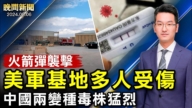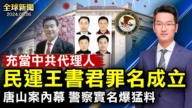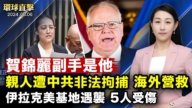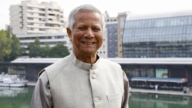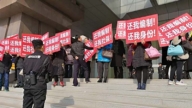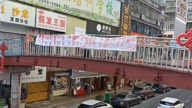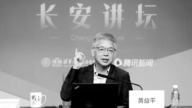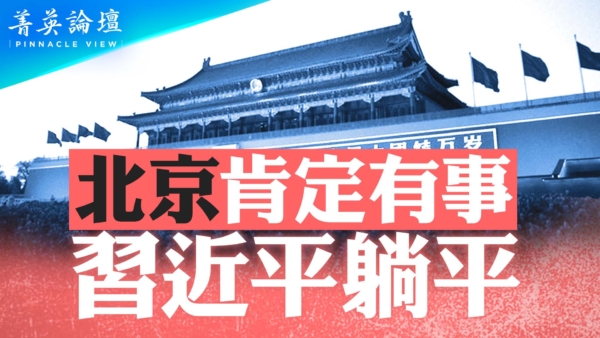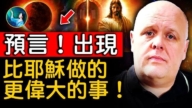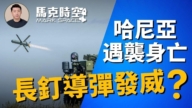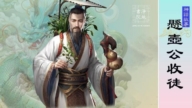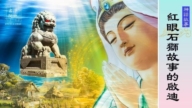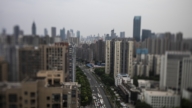【新唐人2013年04月27日訊】今年四月,在越南國會經濟委員會組織的「春季經濟論壇(Spring Economic Forum) 」,與會者搶著發言的現象,被越南經濟學家黎登營(Le Dang Doanh)形容為「爭論激烈」,他說,政府每年都向公眾承諾,情況會更好,但老百姓看不到,這是信任危機。另外,曾擔任越南兩位總理顧問的阮福祥表示,如果一黨治國的集權統治不改革,那麼越南就會走向滅亡。
根據美國《紐約時報》報導,「越南共產黨」面臨日益增長的民怨和體制危機。而越共內部也出現分裂,黨內兩派針鋒相對。一派是傳統勢力,希望延續越南的社會主義指導原則和越共的絕對權力,而另一派則呼籲體制多元化,並完全接納資本主義。
政論家伍凡:「現在他們共產黨跟社會脫節的非常厲害,老百姓非常強烈的要走西方自由民主這條道路,為甚麼?因為南越以前長期就是走資本主義、走自由化道路,現在他們統一以後,北方要把南方吃掉了,現在就鬥爭得非常兇,特別是黨內鬥爭也好,社會的鬥爭也好,兩派的鬥爭非常的激烈。」
身為馬克思主義學者的阮福祥(Nguyen Phuoc Tuong),曾擔任越南兩位總理的顧問,他像許多越南人一樣,不再信奉共產主義,並強烈譴責越南政府。他在接受《紐約時報》採訪時表示,「現在,我們的體制是一黨治國的極權統治,我自己出自這個體制,我了解這個體制的所有缺點、弊端及腐化現象。如果不解決這個體制的問題,它就會滅亡。」
現年77歲的阮福祥還表示,共產黨內部的緊張局面隨著經濟狀況日益惡化。今年2月,他幫助撰寫了一份「致越共總書記的公開信」,信中敦促對越南的憲法進行改革,確保真正的權力屬於人民。但沒有得到回應。
對此,廣州歷史研究者鐘波表示,不受人民監督的政府,在集權腐敗之下,必然走向滅亡。
廣州歷史研究者鐘波:「權力是一個腐蝕劑,誰要到了那一步都會上癮的,以前毛澤東不是說了嗎,蘇聯的今天就是我們的明天,所以呢,出現的那些貪腐、集權,然後腐敗到死亡,這都是一個同樣的過程,以前蘇聯也是這樣腐敗的,這都是歷史的規律。」
「越南共產黨」是越南唯一的執政黨,直接掌控越南的行政、立法、司法各個部門、機構,越共黨員擔任各部門的政務職位。各級地方政府也都是由越共黨員所組成。
越南問題專家卡萊爾•A•塞耶(Carlyle A. Thayer)對《紐約時報》說,現在越南的情況,對於領導層的批評「已經在全社會爆發開來」。他還說,在越南有種矛盾的現象,就是﹕異見者越發活躍,壓制也是如此。
隨著異見者的聲音越來越多,越南政府也試圖進行鎮壓。法庭將無數博客作者、記者和活動人士判處監禁,但是,批評聲似乎有增無減。
據報導,越南的商人抱怨,越共實行的政府監管讓他們不堪重負。而越南的房地產市場由於供過於求而陷入停頓,銀行壞賬負擔沉重,報紙上滿是失業率提高的文章,越南也被全球腐敗觀察機構「透明國際(Transparency International) 」列為腐敗最嚴重的國家之一。
政論家伍凡表示,越南和中共有很多相似之處。
伍凡:「一個是社會不接受他們共產黨的統治,二是經濟下滑非常的厲害,這點跟中共非常相像,中國現在經濟下滑了,引起社會矛盾,引起老百姓跟共產黨的不滿。」
然而,24號,越共中央書記處書記、中央檢查委員會主任吳文裕,率領代表團前往中國上海,會見中共中央政治局常委王岐山,雙方強調繼續加強黨際交流,和相互借鑒所謂「反腐倡廉經驗」。
Vietnamese Communist Party Rule Teetering
In April, the Economic Committee of the Vietnamese
National Assembly organized a conference, the Spring Economic Forum 2013.
The participants were reportedly fighting to
make a speech.
The New York Times cited Dr. Le Dang Doanh,
a leading economist, saying it was “stormy.”
Dr. Doanh said that each year, the government
promises that Vietnam will be better-off, whilst the masses have never seen it.
“It’s a crisis of trust.” Nguyen Phuoc Tuong, former
adviser to two Vietnamese premiers, was also quoted.
He said that if the one-party rule in Vietnam
is not changed, “it will collapse on its own.”
The NY Times reported that the Vietnamese
Communist Party (VCP) is “facing rising anger over a slumping economy.”
Meanwhile, the party is “riven by disputes pitting
traditionalists who want to maintain the country’s
guiding socialist principles and a monopoly on power
against those calling for a more pluralist system
and with that new system a full embrace of capitalism.”
(Critic) Wu Fan: “The VCP has long isolated itself
from citizens.
The public have always longed to
take the path towards democracy. Why?
Because South Vietnam had adopted a capitalist system
and an economic liberalization policy before it was taken over by North Vietnam.
Since then, the dissent has intensified, and
two-force infighting has been very fierce.”
The article mentioned Nguyen Phuoc Tuong, a Marxist
scholar and former adviser to two Vietnamese premiers.
Like many Vietnamese, he “no longer believes in communism”,
and “strongly condemned the Vietnamese Government.”
Tuong told the NY Times, “Our system now is
the totalitarian rule of one party.
I come from within the system — I understand all its flaws,
all its shortcomings, all its degradation.
If the system is not fixed, it will collapse on its own.”
77-year-old Nguyen Phuoc Tuong also remarked that
the tensions inside the VCP “have been heightened
by the troubles with the economy.”
In February, he helped to write an open letter
to the VCP’s general secretary
In the letter, he urged “changes to the country’s constitution
that would ensure that real power belongs to the people.”
He has not yet got any response.
Zhong Bo, Guangzhou-based historical researcher,
comments.
A government, under no public watchdog but riven
with centralized corruption, will inevitably collapse.
Zhong Bo: “Power is corrosive and
people also become addicted to it.
Mao Zedong once said that,
“the Soviet Union’s today is our tomorrow.”
So it’ll go through the same process
as the Soviet Union did.
Firstly, corruption and concentration of power appeared.
Then, the system became rotten, until its final demise.
That is a law that repeats itself throughout history.”
The VCP is the sole ruling party in Vietnam. It controls all
the administrative, legislative and judicial sectors.
The VCP members steer all these departments and
lead local authorities.
The NY Times cited Carlyle A. Thayer,
prominent among foreign scholars of Vietnam.
He said that in today’s Vietnam, “criticism of the
leadership has exploded across all levels of society.”
“There’s a contradiction in Vietnam,
dissent is flourishing, and so is repression.”
In facing growing voices of dissent, the Vietnamese
government has tried to crack down.
“Courts have sentenced numerous bloggers,
journalists and activists to prison.
Yet criticism, especially online, continues
seemingly unabated,” said the newspaper.
The article stated that Vietnamese business people
complain of overbearing government regulations imposed by the VCP.
“The real estate market is frozen by overcapacity,
banks are saddled with bad loans.
Newspapers are running articles about
rising unemployment.”
Furthermore, Transparency International has ranked
Vietnam as one of the world’s most corrupt countries.
Wu Fan speaks about similarities
between the VCP and the CCP.
Wu Fan: “Firstly, the masses no longer accept the VCP’s rule;
Secondly, it faces a plummeting economy.
This is very similar to what the CCP faces in China. This has
fueled social conflicts and has ignited popular discontent.”
On April 24, a Vietnamese delegation arrived at Shanghai.
It was headed by Ngo Van Du, the VCP Central Committee
Secretariat, and Central Inspection Committee Chairman.
Ngo Van Du met with Wang Qishan, a member of
CCP Politburo Standing Committee.
Both sides reportedly claimed that they had strengthened
inter-party exchanges.
As well as having learned from each other’s “experiences on
combating corruption and building a clean government.”


